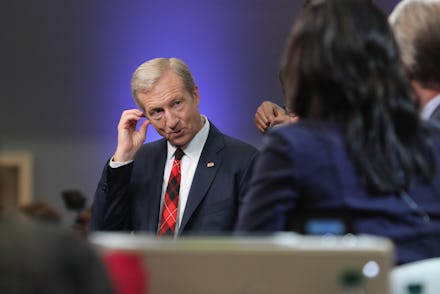Half of Americans think billionaires have made the 2020 primaries worse

Half of American voters believe the presence of billionaires in the race for president is harmful to the Democratic primary process, a new poll from Ipsos and Newsy shows. When asked if "billionaire candidates using their personal wealth to fund their political campaigns are having a negative impact on the 2020 Democratic primary," 54% of Democratic respondents and 49% of Republican respondents said yes. In total, 50% of respondents said the ultra-wealthy candidates were hurting the Democratic race.
There are currently two billionaires vying for Democratic nomination: former New York City Mayor Michael Bloomberg, and philanthropist Tom Steyer. The poll's results challenge the central tenet of both Bloomberg and Steyer's political ethos: that their immense wealth will enable them to defeat President Trump in the general election and solve key issues most important to Democratic voters.
Because billionaires like Bloomberg and Steyer don't rely on grassroots funding in the way that other candidates do, both men were able to enter the Democratic race much later than the other candidates and have used their personal funds to bankroll their campaigns. Bloomberg has pledged to spend up to $1 billion of his personal $64 billion fortune on his campaign; he's already spent more than $350 million in early state ads. That's more than the Democratic National Committee spent on President Barack Obama's entire re-election campaign in 2012.
Both men, but Bloomberg especially, have had to defend themselves against accusations that they're using money to buy their way onto the Democratic debate stage and onto the ballot. Bloomberg's immense wealth has also been reportedly leaving a dearth of available staff in its wake, as his ability to pay workers far more than other campaigns can has limited what's available to state and local campaigns. That could affect Democrats' chances in down-ballot races, observers fear.
The poll’s findings also bolster the platforms of some of Bloomberg and Steyer's competitors. Vermont Sen. Bernie Sanders, the self-proclaimed democratic socialist who has said that billionaires shouldn’t exist, has made radical redistribution of wealth a center of his campaign. His argument: No one needs a billion dollars (or much more than that, like Bloomberg has) given that there are approximately half a million homeless Americans and that most Americans can’t afford a $400 emergency expense.
Elizabeth Warren, the Democratic senator from Massachusetts, is running on a similarly inequality-driven platform. Her major proposal has been to tax the ultra-rich, revenue from which would support her plans for universal child care and student debt relief. A Business Insider poll from earlier this month showed that 54% of Americans support the tax.
The Ipsos/Newsy poll was conducted online from Feb. 21 to Feb. 25 across all 50 states. During that time, the Nevada caucuses were held, as was a primary debate in South Carolina. The poll surveyed 2,010 adults of voting age and has a margin of error of 2.5 percentage points.